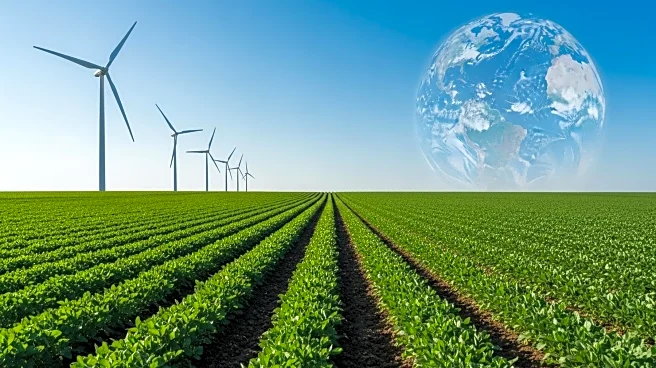What is the story about?
What's Happening?
As the world gears up for COP30 in Belém, Brazil, agriculture is being recognized as a critical component in the fight against climate change. Agriculture is responsible for 22% of global greenhouse gas emissions, according to the Intergovernmental Panel on Climate Change (IPCC). Syngenta Group, a leader in agricultural technology, is promoting five innovative solutions to ensure agriculture contributes positively to climate change mitigation and global food security. These solutions include revitalizing degraded land, advancing climate-resilient crops, increasing productivity through technology, scaling precision agriculture, and promoting regenerative practices. The Food and Agriculture Organization (FAO) is preparing a roadmap report to be unveiled at COP30, emphasizing the role of innovation in achieving sustainable food production.
Why It's Important?
The significance of these developments lies in the urgent need to address the stagnation in global agricultural productivity, which grew only 0.76% globally in 2025. With the demand for agricultural products expected to rise over 1% annually until 2031, productivity growth must accelerate to 2% per year between 2024 and 2050 to meet global food demands sustainably. Syngenta's initiatives, such as the REVERTE® program in Brazil, aim to recover 1 million hectares of degraded land, offering a profitable alternative to clearing native vegetation. These efforts are crucial for feeding a projected population of 10 billion by 2050 while reducing environmental impact.
What's Next?
At COP30, Syngenta will partner with The Economist to host a panel discussion titled 'Farming for the Future: Boosting Agricultural Productivity While Protecting the Planet.' This session will explore land restoration, soil health, financing, and policy solutions to make sustainable farming economically viable and scalable. The panel will include experts from Syngenta, The Nature Conservancy, and other key stakeholders, aiming to drive policy and practical solutions for sustainable agriculture.
Beyond the Headlines
The broader implications of these initiatives include potential shifts in agricultural practices globally, with a focus on sustainability and climate resilience. The emphasis on regenerative agriculture and precision farming could lead to long-term changes in how food is produced, potentially influencing global food security and environmental conservation efforts.















